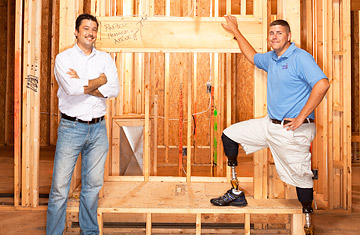
(4 of 5)
Wes Moore will tell you, without hesitation, that the values and ethics of the Army saved his life. He grew up tough in Baltimore and the Bronx. His dad died when he was young, and he began to get into trouble. His mother and her parents scraped together the money to send him to Valley Forge Military Academy. From there, he went on to the Army and, eventually, Johns Hopkins University and, on a Rhodes scholarship, Oxford. On one of his visits home from the military, Moore found out that a young man with the same name as his, who had lived two blocks away in Baltimore, had just been convicted of murder and would be spending life in prison. Moore befriended "the other Wes Moore" — which became the title of the best-selling book he wrote about the forces that had sent them to such different fates. He also started a mentoring program for first-time criminals in Baltimore while working for Citibank in New York. (He has since left Citibank and is developing educational-technology products for Oprah Winfrey.)
I once asked Moore whether the skills he learned in the Army had any influence on his life as a civilian. "Absolutely! On every big decision I make," he said and began to tell me about his tour as a counterintelligence officer in a difficult section of eastern Afghanistan. "People have the wrong impression of the military," he said. "It is extremely entrepreneurial. I had more freedom to make decisions there than I do at Citibank. My commander would tell me what needed to be done, and then it was up to me to figure out how to do it."
Actually, Moore — and every other military officer — was trained to construct an action plan for every mission. "We were taught to write a five-paragraph memo. I still use it whenever I have a major decision to make. Want me to show you how it works?" And he proceeded to lay out a five-point memo describing his proposed campaign to stop the city of Baltimore from building a $70 million juvenile-detention facility and channel the funds to more-productive programs for at-risk kids. The inevitable military acronym for the five-paragraph memo is SMESC, and the mnemonic device is "Sergeant major eats sugar cookies." Situation: What's the problem? Mission: What's our strategy for solving it? Execution: What tactics are we going to use? Support: What are the logistics; how many troops and what sort of equipment will we need? Command: What other organizations (air strikes, aerial reconnaissance, Afghan security forces) will have to be involved? "You know, it's difficult to leave the military and not come out bored," Moore told me. "There's a significant letdown, which is a big part of the psychological problems so many of us have. In civilian life, you miss the sense of excitement and purpose and camaraderie. But I think that's what is motivating so many of us into different forms of public service."
Public-Service Warriors
More than a few of the veterans who are doing extraordinary things were altruists before they joined the military. Seth Moulton, the Harvard valedictorian, decided to join the Marines because it was the "purest form of service," even though his mother told Boston magazine she initially thought that "there was no career choice he could have made that would have made me more unhappy, except if he had chosen a life of crime." Rye Barcott decided to prepare for his stint in the Marines by visiting the enormous Kibera slum in Kenya — he speaks Swahili — and writing his senior thesis at the University of North Carolina about ethnic differences there. Eventually, Barcott found himself simultaneously serving as an intelligence officer in Iraq and launching a nongovernmental program in Kibera, which featured interethnic soccer teams and a health clinic. Eric Greitens decided to become a Navy SEAL when he visited Rwanda after the genocide, which he believed could easily have been prevented by a careful use of military force.
For others, like Brian Stann, the altruism really kicked in after their military service ended. Stann received a Silver Star for his heroism when his unit was isolated in Iraq and he spent nearly a week fending off repeated enemy attacks by coordinating air strikes and organizing a perimeter defense. When I met him in Alpharetta, Ga., Stann didn't mention any of this, nor did he speak very much about his stellar career in ultimate fighting. (He is currently the sixth-ranked middleweight.) He was, however, obsessed with his responsibility to the Marines under his command who didn't make it.
"I lost friends who will never have the opportunities I've had — to get married and have children or just to have a peaceful day with friends. I live every day for them," Stann told me and then began to describe the way he found to honor them: Hire Heroes, the employment program he runs. "We teach them how to do résumés, how to present themselves for interviews, and then match them with prospective employers. It's amazing, but a lot of them never list their military service on their résumés. They think it isn't relevant — or they think it might work against them, given all the bad publicity we've gotten." Stann said he often runs into employers who are reluctant to hire vets for those reasons. "I tell them, 'No decision you'll ask them to make will be harder than decisions they've already made. No amount of pressure you put on them will equal the pressures they've already experienced.'" (There are some companies that understand the value of these qualities: Siemens has set a goal of making veterans 10% of all new hires.)
